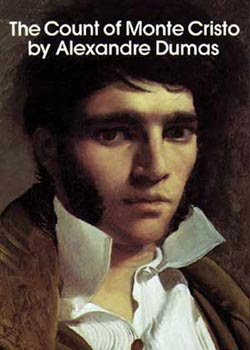The Count Of Monte Cristo: Exploring Themes Of Revenge And Justice

Table of Contents
The Allure and Dangers of Revenge in The Count of Monte Cristo
Edmond Dantès's Transformation:
Edmond Dantès's unjust imprisonment forms the crucible in which his thirst for revenge is forged. The psychological impact of his wrongful conviction is profound. Years of confinement, deprivation, and the betrayal of his friends shatter his former innocence, fueling an all-consuming desire for retribution. This transformation is not simply a shift in emotion; it's a complete metamorphosis of his character.
- Psychological Devastation: The brutal conditions of the Chateau d'If break Edmond's spirit, yet simultaneously steel his resolve. The loss of his beloved Mercédès, his ruined future, and the crushing weight of injustice drive him to meticulously plan his elaborate revenge.
- Meticulous Planning and Execution: Edmond's escape and subsequent acquisition of wealth and power are not accidental. His revenge is carefully orchestrated, a calculated dismantling of the lives of those who wronged him. He displays remarkable patience, intellect, and a chillingly effective understanding of human psychology.
- Moral Complexities: The question of whether Edmond's revenge is justified remains a central theme. While his suffering is undeniable, his actions, often ruthless and manipulative, raise significant moral questions. Is an "eye for an eye" truly justice, or simply a perpetuation of violence? Dumas leaves this question open for the reader to contemplate.
The Cycle of Revenge:
Edmond's pursuit of revenge inadvertently creates a destructive cycle, mirroring his own suffering in the lives of those he targets. His actions have devastating consequences for Fernand Mondego, Danglars, and Villefort, each experiencing forms of ruin that echo Edmond's own ordeal.
- Fernand Mondego's Downfall: Fernand, driven by ambition and jealousy, is exposed as a liar and traitor, losing his honor, fortune, and ultimately, his life. His punishment reflects the bitter consequences of his betrayal and cruelty.
- Danglars' Ruin: Danglars, the avaricious and manipulative banker, suffers financial ruin and social disgrace. His relentless pursuit of wealth leads to his ultimate downfall, mirroring his selfish and treacherous nature.
- Villefort's Destruction: Villefort, the ambitious prosecutor, experiences the devastating consequences of his complicity in Edmond's wrongful imprisonment. His family is torn apart, his career ruined, and his conscience consumed by guilt.
- The Limitations of "An Eye for an Eye": The novel powerfully illustrates the limitations of the principle of "an eye for an eye." While Edmond initially finds satisfaction in his revenge, it ultimately leaves him unfulfilled, highlighting the self-destructive nature of the cycle of retribution.
Justice and Injustice in The Count of Monte Cristo
The Perversion of the Justice System:
The Count of Monte Cristo offers a scathing critique of the justice system, exposing its flaws and inherent injustices. The novel highlights the vulnerability of the innocent in the face of powerful, corrupt individuals who manipulate the system for personal gain.
- Corruption and Bias: The novel demonstrates how easily the judicial system can be manipulated by wealth and influence. Edmond's wrongful conviction is a stark example of the system's inherent biases and susceptibility to corruption.
- Exploitation by the Powerful: Powerful figures like Villefort use their positions to suppress the truth and protect themselves, showcasing how the system protects the powerful while leaving the vulnerable defenseless.
- The Vulnerability of the Innocent: Edmond's experience serves as a cautionary tale, revealing how easily the innocent can be entrapped by a biased and corrupt system.
Edmond's Pursuit of Justice (or is it?):
While Edmond seeks to right the wrongs done to him, the question remains: is his pursuit true justice or simply another form of vengeance? His methods, often cruel and manipulative, blur the line between retribution and justice.
- Legal and Moral Implications: Edmond's actions often bypass the legal system, highlighting the limitations of formal justice in addressing profound injustices. His approach raises critical questions about morality and the ethics of retribution.
- Personal Revenge vs. True Justice: The novel forces us to confront the difference between personal revenge, driven by emotion, and true justice, which strives for fairness and restoration.
- A Greater Good?: Some argue that Edmond’s actions, despite their brutality, ultimately serve a greater good by exposing corruption and punishing the guilty. This perspective, however, doesn't fully reconcile the moral ambiguity of his methods.
Betrayal and Redemption in The Count of Monte Cristo
The Betrayal of Friends:
The betrayals Edmond suffers are pivotal to the plot, shaping his transformation and driving his quest for revenge. These acts highlight the fragility of trust and the devastating consequences of misplaced faith.
- Fernand, Danglars, and Villefort: Each character plays a crucial role in Edmond's downfall. Their motivations, a mix of ambition, jealousy, and self-preservation, expose the darker aspects of human nature.
- The Motivations Behind Betrayal: The novel explores the complex motivations behind these betrayals, revealing the interplay of ambition, fear, and self-interest that can lead to such devastating acts.
- The Fragility of Trust and Friendship: The betrayals in The Count of Monte Cristo underscore the vulnerability of trust and the ease with which friendships can be shattered by deceit and self-serving desires.
The Possibility of Redemption:
The novel explores the elusive nature of redemption, leaving the possibility of forgiveness and reconciliation ambiguous. It questions whether true change and atonement are possible for those who have committed grave wrongs.
- Forgiveness and Reconciliation: While some characters express remorse, the possibility of genuine forgiveness and reconciliation remains uncertain. The weight of past actions casts a long shadow.
- True Change and Atonement: The novel raises the question of whether characters like Fernand and Villefort genuinely change, or merely experience consequences for their actions.
- Ambiguous Nature of Redemption: The ending of The Count of Monte Cristo leaves the question of redemption open-ended, reflecting the complex and often uncertain nature of moral transformation.
Conclusion:
The Count of Monte Cristo is more than just an adventure story; it's a profound exploration of revenge, justice, betrayal, and the possibility of redemption. Dumas masterfully weaves together these complex themes, leaving readers to ponder the moral implications of seeking vengeance and the elusive nature of true justice. The novel's enduring appeal lies in its exploration of human nature and the enduring power of both hatred and forgiveness.
Have you been captivated by the complex themes of The Count of Monte Cristo? Share your thoughts on the novel's exploration of revenge and justice in the comments below! Let's discuss the enduring legacy of this classic tale and its continued relevance today. Further explore the complexities of The Count of Monte Cristo by reading more analyses and discussions online.

Featured Posts
-
 Sorte Ou Habilidade Analise Do Empate Do Corinthians Contra O America De Cali
May 05, 2025
Sorte Ou Habilidade Analise Do Empate Do Corinthians Contra O America De Cali
May 05, 2025 -
 Migrant Spends Eight Hours In Tree To Evade Ice Arrest Cnn Report
May 05, 2025
Migrant Spends Eight Hours In Tree To Evade Ice Arrest Cnn Report
May 05, 2025 -
 Is This Thing On Exclusive Photos Of Bradley Cooper Directing Will Arnett In Nyc
May 05, 2025
Is This Thing On Exclusive Photos Of Bradley Cooper Directing Will Arnett In Nyc
May 05, 2025 -
 Controle Des Risques Un Guide Complet
May 05, 2025
Controle Des Risques Un Guide Complet
May 05, 2025 -
 Timao Superior Vitoria Por 2 A 1 Contra O Santos Neymar Sem Brilhar
May 05, 2025
Timao Superior Vitoria Por 2 A 1 Contra O Santos Neymar Sem Brilhar
May 05, 2025
Latest Posts
-
 Canelo Vs Paul Turki Al Sheikhs Strategic Errors Cost Millions Of Viewers
May 05, 2025
Canelo Vs Paul Turki Al Sheikhs Strategic Errors Cost Millions Of Viewers
May 05, 2025 -
 Turki Al Sheikhs Missed Opportunity 40 50 Million Viewers Lost In Canelo Paul Fight
May 05, 2025
Turki Al Sheikhs Missed Opportunity 40 50 Million Viewers Lost In Canelo Paul Fight
May 05, 2025 -
 Mexico Ufc O Canelo La Batalla Por La Audiencia
May 05, 2025
Mexico Ufc O Canelo La Batalla Por La Audiencia
May 05, 2025 -
 Ufc O Canelo La Gran Pelea En Mexico
May 05, 2025
Ufc O Canelo La Gran Pelea En Mexico
May 05, 2025 -
 Canelo Y Ufc Choque De Titanes En Mexico
May 05, 2025
Canelo Y Ufc Choque De Titanes En Mexico
May 05, 2025
